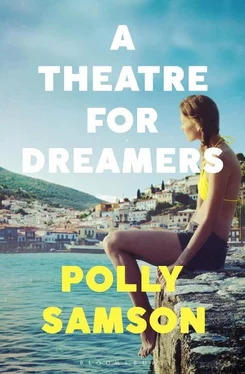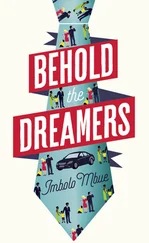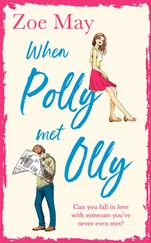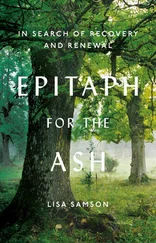She picks up my book and turns to the first story.
Leonard smiles when he sees it.
‘I suppose you read it in the original French,’ Jimmy says, and I see a brief flare in his eyes that might be envy as Leonard inclines his head in affirmation and strikes a match for his cigarette. Though not boastful, Leonard gives off an unmistakable air of a man who has always been there before you. He possesses that old-soul thing of wisdom more ancient than his body and his face. He also has beautiful Lena beside him. She takes the cigarette from his lips, puts it between her own. Yesterday Lena was a painter from Sweden, fresh from the ferry; today they seem acquainted well enough for her to be wearing his amber komboloi as a bracelet.
Charmian unsuccessfully stifles a snort as she reads out loud from the Sartre. ‘A woman doesn’t have a right to spoil her life for some impotent,’ and puts her hand to her mouth as George hoves into view. She closes the covers, regains her composure. ‘These are terribly good. I remember this title story “Intimacy” especially. Some of what I was so incoherently saying last night about choices and freedom is debated marvellously well in this story. Do read it, Erica.’
‘Well, that was some bloody evening,’ George is saying as he comes from the cigarette shop. Overnight he seems to have gained in stature. He’s a good head taller than anyone else and walks like a gunslinger, a cigarette pasted to his under-hung lip. Charmian calls to Nikos Katsikas to bring him a drink.
‘I don’t know what would have happened if you hadn’t been there, George,’ she says. She lowers her voice to include only me and Jimmy, widens her eyes. ‘We had quite a scene after you left. Axel turned up and wanted to fight George. And once George had seen him off I almost had to tie Marianne down to stop her running after him. I dread to think what that maniac’s capable of doing when he’s in one of his rages. Patricia’s left the island, thank Christ, but to think Marianne could’ve married Sam Barclay and sailed the world on that splendid boat of his.’
Patricia has left the island. That is good news. I look around me, at the tables and their chattering groups, a hundred dramas unfolding. I love this time of day with everyone here, the chink of coffee cups and sudden bursts of laughter, the familiar cats, even the donkeys seem to gossip amid the traffic of working men, trundling carts, the stalls of fish and pyramids of fruit, the women with their baskets. There’s lightness, hope, good humour, beneath the noonday sun, a frisky air of anticipation at who or what might drift ashore. There are so many more awnings now than when we first arrived. Dark blue ones, and stripes, and beneath them tables stretching all the way to the ferry dock where any of our wildest dreams might disembark.
Panayiotis has brought his pretty young wife with him to drink cold orangeade and Charmian trots over to ask after her mother’s health while Jimmy engages Panayiotis in an excitable conversation about catching a shark which involves more miming than words. Panayiotis’s wife has her white headscarf crossed at the chin in the traditional Greek way, but her eyes are as carefully painted as any teenage girl. She laughs behind her hands as Jimmy gets carried away doing his shark impression.
A plump woman in a voluminous blue shirt-waister is being led across the harbour on a sagging donkey with blue reins. She holds a blue parasol at a haughty angle, but her steed lets her down with a dump right in front of us and her donkey-boy has to go back with his shovel. George is struggling not to laugh. ‘Good to have you back, Katerina,’ he calls and she waves to him before clapping her hands at the boy to hurry.
‘Everything blue in her house, every pot, jug, even the linen, all blue against the evil eye,’ he says and hacks away coughing and laughing telling us a story. Apparently Marc Chagall had the cheek to fill two pages of her visitors’ book. ‘She was incensed, ripped them out and threw them on the fire, didn’t have a clue who he was because she only had eyes for Princess bloody Margaret and assumed the doodling little foreigner was a lackey from the boat Her Royal Highness sailed in on.’
All around me people are chattering, as though every trouble has faded and disappeared with the moon. George’s sunny good mood is barely dulled by the sight of a near-naked Jean-Claude Maurice. Jean-Claude has sensibly chosen a spot three coffee houses along. He has his feet on the chequered plastic tablecloth and his gaze flicks quick as a lizard’s tongue from Trudy, who wears a crown of yellow marguerites in her red hair, to a German girl blancmanging out of a playsuit towards him from a yacht.
George picks up my Sartre stories, grunts and turns to Leonard. ‘I take it that popinjay over there has bored you shitless with his pointless bloody tales of hanging around at Les Deux Magots with the author. I try not to let it affect my reading of his texts,’ he says and Leonard splutters into his coffee. George plays around, maligning Jean-Claude until his own laughter is overtaken by coughing and his handkerchief.
Leonard shoots a glance at Jean-Claude and returns to the book of stories that everyone but me appears to have read.
‘The thing about Sartre is that he’s never lost his mind. He represents a wonderful Talmudic sense of human possibility, but I know he’s never going to say, “And then the room turned to gold.” He’ll say, “The room turned to shit.”’ He leans across to offer a bang to George’s back, continues: ‘But the room sometimes does turn to gold and, unless you mention that, your philosophy is incomplete.’ He looks at me from beneath his sixpenny cap and when I don’t respond gives me an awkward smile and returns to Lena’s conversation with Göran, despite it being in Swedish.
Charmian watches George stuff away his handkerchief and pours him a glass of water. George waves it away and lights a cigarette. Sofia brings the sardines and the cats follow every forkful with orphan eyes.
For once George has an appetite and he picks at Jimmy’s ambitions to be a writer in much the same way as he takes to the fish on his plate.
Jimmy says, ‘Let me show you some pages,’ and his eyes are as hungry as the cats’.
Charmian smiles at him, as one might at a child who charmingly believes in fairies. ‘So many of the young people who come here to write and paint end up frittering their talent away. That is, if they have any talent to fritter.’
Jimmy hardens his jaw. ‘I have talent,’ he says. ‘And I get more work done here than I ever did in London.’
‘Well, if you’re going to wrestle with the muses on their home turf you’d better be good and don’t be surprised if you come away with a bloody nose,’ George says, and a look passes between him and Charmian that speaks of a thousand old bruises.
The stage is emptying as people trail off to the post office or back to their houses or to the rocks, to seek inspiration or love or to swim.
Jimmy and I buy bread, wine and peaches and a pat of goat’s cheese. The sun is beating and we detour to the pharmacy for sun cream. Inside Rafalias’s the blue glass bottles are ranged on carved wooden cabinets, beneath a Venetian ceiling. A plaster bust of Hippocrates demands silence. We see Marianne and Axel stride past the door in matching blue-striped shirts, the sun in their hair and the little white dog trotting behind. Marianne laughs at something Axel says, and buries her cheek in his shoulder. Axel is carrying a window frame, his hands wrapped in bandages. In several places the pale-green painted wood is broken and splintered, jags of glass wink from old putty. Marianne clutches a wrecked chair beneath her arm. We walk behind them through the lanes to Francisco’s workroom. They don’t stop talking all the way.
Читать дальше





![Джон Макдональд - Wine of the Dreamers [= Planet of the Dreamers]](/books/430039/dzhon-makdonald-wine-of-the-dreamers-planet-of-thumb.webp)






